Professor Georgina V. Long, MD, PhD, FRACP, Chair of Melanoma Medical Oncology &Translational Research, Translational Node, Faculty of Medicine and Health at The University of Sydney. In this video, she speaks about the ASCO 2022 Abstract – Distant Metastasis-Free Survival With Pembrolizumab Versus Placebo As Adjuvant Therapy In Stage IIB Or IIC Melanoma: The Phase 3 KEYNOTE-716 Study.
Synopsis:
In this two-part trial, patients with surgically resected high-risk Stage II melanoma will be compared to the safety and efficacy of pembrolizumab (MK-3475) versus placebo. Part 1 participants will be randomly assigned to either pembrolizumab or placebo in a double-blind design for up to 17 cycles (each cycle = 21 days). Participants who receive placebo or discontinue treatment after receiving 17 cycles of pembrolizumab in Part 1, do not experience disease recurrence within 6 months of finishing pembrolizumab in Part 1, and do not discontinue treatment with pembrolizumab for disease recurrence or intolerability, may be eligible for up to 35 additional cycles of pembrolizumab in Part 2 in an open-label design. The study’s key hypothesis is that pembrolizumab improves recurrence-free survival (RFS) when compared to placebo.

